With a great CV, your consulting cover letter can open the door to scoring an interview and, ultimately, getting a job in consulting.
But it’s not that easy: less than 30% of applicants receive a call for an interview.
Thus, in this article, I’ll show how to write a persuasive and customized cover letter to move your job application to the top of the pile.
In particular, I’ll show you the exact steps you need to take to write a consulting cover letter that:
- Set you apart from the crowd
- Express your motivation to join the firm you are applying to
But first, let me introduce you to Paul.
Paul is a recent graduate from a business school in France.
He did two internships (one in Marketing and one in Finance).
Paul used the tips from this article to learn how to write a cover letter for a consulting job and landed job interviews in ALL the consulting firms he applied to.
At the end of this article, you’ll see Paul’s consulting cover letters for McKinsey, the Boston Consulting Group, Bain & Company, and Deloitte.
Also, you’ll find a consulting cover letter template to help you craft your consulting cover letters.
Let’s get started!
Table of Contents
Get the latest data about salaries in consulting
What is a cover letter?
Along with your resume, a cover letter is an important part of your consulting job application.
It is intended to provide a more in-depth introduction, enhancing the information in the resume or CV, outlining pertinent qualifications, and showcasing some of your most noteworthy achievements.
A strong cover letter convinces the employer that your skills align with their requirements and demonstrates the following:
- Justifications for your qualifications for the job.
- An explanation of why you want to work as a consultant.
- Justifications for why you would be a good fit for their particular company.
- Your capacity for producing engaging, clear, and concise writing.
A strong cover letter should ultimately focus on “why should we hire you” and “what’s in it for us.”.
And for that reason, it’s worthwhile to take the time to write a strong cover letter.
What recruiters want
The consulting recruiting process is costly for top consulting firms.
Do the math:
Multiply the time spent by a management consultant giving interviews by their fees.
You’d get an insanely high number.
Therefore, management consulting firms want to invite only candidates with a serious chance of making it.
To do so, they use two selection criteria.
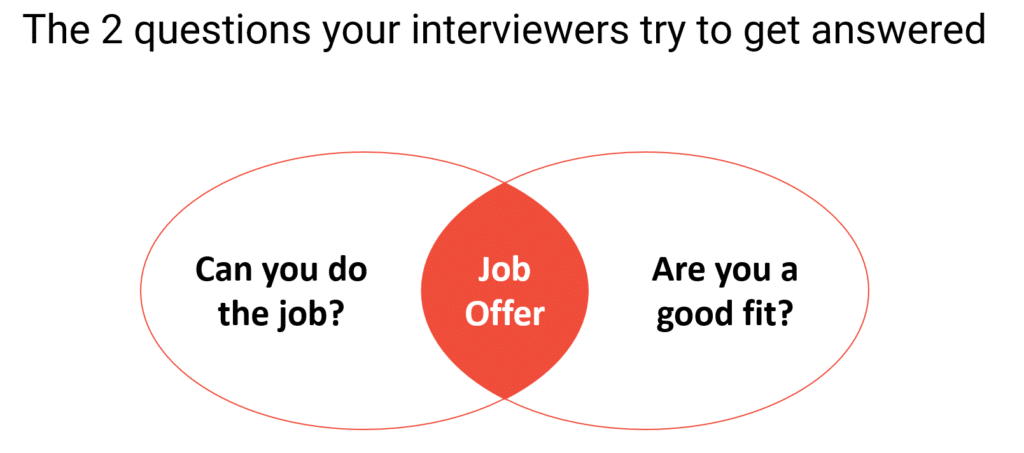
Selection criteria 1: do you have the right consulting skills?
ALL consulting firms essentially look for these 4 skills when screening your application documents (resume and consulting cover letter):
- Problem-solving: As a Consultant, you will be essentially a problem-solver. Thus, Consulting firms will assess the range of problems you had to solve and the impact you had.
- Leadership abilities: As a Consultant, you must get things done while working with others. Thus, Consulting firms will assess your ability to work in teams and create a climate where people are motivated to do their best.
- Personal impact: As a Consultant, you will need to gain the support and commitment of others. Thus, Consulting firms will assess your ability to develop relationships with people and influence someone to act upon your recommendation.
- Drive: As a Consultant, you will work on new consulting projects every 3x months. Thus, Consulting firms will assess how comfortable you are with new situations and your ability to perform outside your comfort zone.
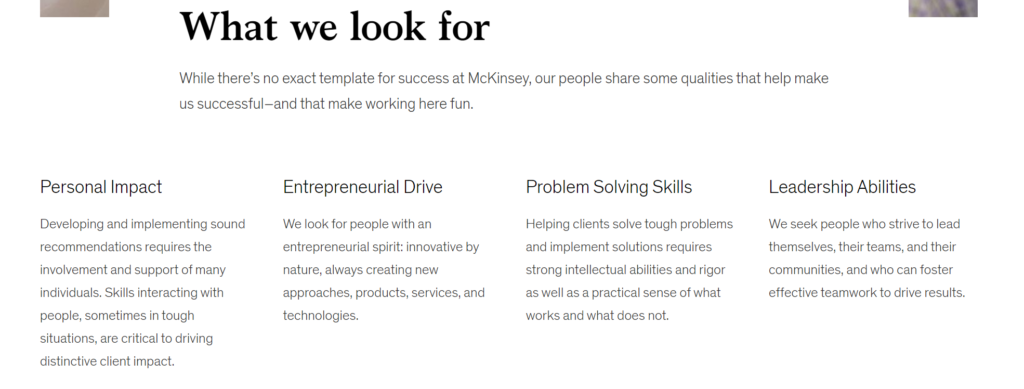
Selection criteria 2: are you a good fit?
A career in consulting is not for everyone.
It’s demanding.
And it can sometimes be stressful.
Therefore, management consulting firms want to assess your motivation to pursue a career in consulting.
And more specifically, a career in consulting in their firm.
To do so, they’ll assess if you’ve done your homework.
For instance, do you understand what consultants do?
And do you understand what makes them different from other management consulting firms?
Related articles:
Your answer to the question Tell me about yourself must be consistent with the information on your resume.
Check this article explaining how to craft a superior answer to the question “Tell me about yourself.”
Also, read this article to learn more about the recruiting process at McKinsey.
Besides, I’ve written articles about the recruiting process at Boston Consulting Group and Bain & Company.
How to write a consulting cover letter: your step-by-step guide
Good consulting cover letters tend to follow a tried-and-trusted format.
One that’s set up in a way that lets you show off your accomplishments and what are your motivations to join this consulting firm in particular.
If you’re worried about sticking to the same format as everyone else somehow stopping you from standing out, don’t.
It’s what you say (or don’t say) that counts.
Let’s break down how your cover should look.
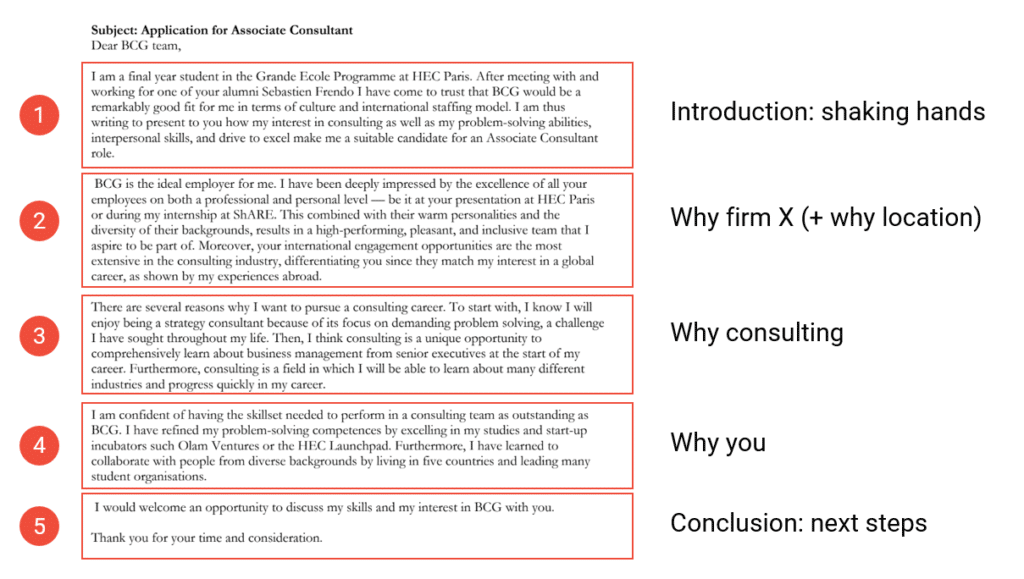
Step 1: Add the header (mandatory)
To begin with, start your cover letter with the following information:
- Name
- Phone number
- Email address
- Date of sending
In addition, you can include the company’s name and address to which you’re applying.

Step 2: include the greetings (mandatory)
The greeting needs to display the right level of respect and professionalism.
If you have a name for the contact person, use it.
If you don’t know the contact person’s name, you can begin your cover letter with “To whom it may concern” or “Dear Sir or Madam.”
However:
Do your best to find out to whom you’re writing to.
Look at the company website or LinkedIn page to see if you can track down the hiring manager’s name.
Or take the initiative to call the company.
Someone on the other end of the phone might be happy to tell you who does the hiring.
Step 3: write the opening paragraph (mandatory)
If you were to meet a hiring manager in person, you wouldn’t just throw your resume in their face and walk away, would you?
I’d like you’d offer a handshake and tell them who you are first.
This paragraph is like a good handshake.
You want your first paragraph to be strong, succinct and make a great first impression.
In your opening paragraph, start strong: show enthusiasm and show you want to come in there and make a contribution.
Hook the reader early with a first paragraph that makes them want to read.
You can use these guiding questions to craft the first paragraph of your cover letter.
- Which position are you applying to? Consultant in the BCG Munich office
- What are your personal qualities? Results-driven and eager to learn.
- Who are you? What are your past and present experiences? A final-year student at HEC Paris who completed two internships in the Banking and Technology sectors
- What is your most impressive achievement? Experience in working with C-level management teams

This is an important cover letter tip:
Mention the position you’re applying to (Business Analyst, Senior Consultant, Associate, etc.)
Step 4: explain why you are a good candidate (mandatory)
Your management consulting cover letter must say why you’re the right person for the job.
This is one of the most important consulting cover letter tips.
To do so, you must highlight the specific skills and experiences that make you an ideal candidate for consulting.
For instance, here is how Paul has highlighted his skills in his consulting cover letter.
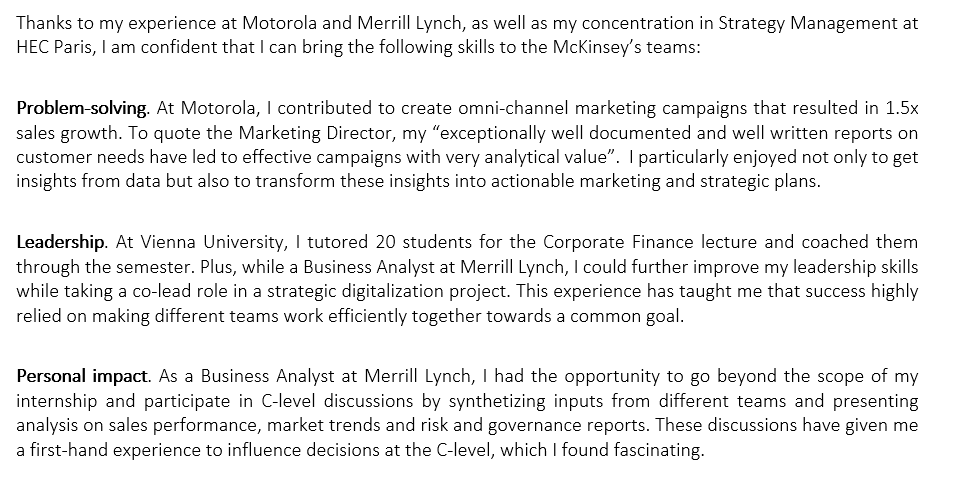
Here are the four steps followed by Paul to show off his skills in his cover letter:
- Step 4.1: List your most impressive achievements and write a great resume.
- Step 4.2: Select three skills you want to emphasize.
- Step 4.3: Select three achievements that best illustrate how you used those three skills.
- Step 4.4: Highlight these three achievements in your cover letter. But don’t repeat your resume word by word; show your personality instead.
Step 4.1: List Your Most Impressive Achievements And Write A Great Resume
In the “Consulting resume: 11 steps to get interviews in 2023” article, you have the exact steps you need to take to:
- List your most impressive achievements
- Summarize these achievements into compelling action statements in your resume
- Format your resume with a ready-to-use template
- Get inspired with (literally) hundreds of examples
- And much more…
So, start your cover letter… by writing your consulting resume!
You can also watch this video to craft a consulting resume that gets interviews.
Step 4.2: Select The 3 Skills You Want To Emphasize In Your Consulting Cover Letter
Choose the three skills you want to emphasize in your cover letter.
For instance :
- Problem-solving: how you used your analytical and quantitative skills to solve a problem and had an impact
- Leadership skills: how you got something done while working with someone or a group of people
- Personal impact: how you influenced people to act upon your recommendations
Another cover letter tip:
Do NOT put three achievements in your cover letter that illustrate the same skills twice or thrice.
If you do so, you will undermine your profile…
And lose an opportunity to show that you are a well-rounded professional.
Step 4.3: Select The 3 Achievements That Best Illustrate How You Used Those Skills
You now must have a great list of achievements and an outstanding resume.
Now, it’s time to select which achievements you will highlight in your cover letter.
To do so, select which achievements best illustrate your experience in three chosen skills.
To do so, choose three achievements you feel are your strong suits to focus on.
For instance, you can ask yourself:
- Which achievements are you most proud of?
- Where did you have the biggest impact?
- Which achievements were the most challenging?
Step 4.4: Highlight These 3 Achievements In Your Cover Letter. But Do NOT Repeat Your CV Word-By-Word; Show Your Personality Instead
Finally, highlight these three achievements in your cover letter.
However, your cover letter shouldn’t just rehash your resume.
In other words, do not repeat your word-by-word resume.
Because this will give a weak impression.
Instead, use the letter to tell a brief story, such as “my toughest sale” or “my biggest technical challenge,” and show your personality.
That’s how you will stand out from the rest.
It will make a HUGE difference if you show your personality when highlighting your achievements in your cover letter.
The secret to showing your personality is to tell the readers WHY these achievements matter to YOU.
For instance:
- WHY this achievement was important for you
- WHY this achievement, in particular, was challenging
- Why did you enjoy this achievement
- WHY this achievement left a positive (or negative) mark on you
Do you see the pattern here?
To make it personal, explain WHY a particular achievement is important for YOU.
There are four reasons why a particular achievement can be important for you:
- You had to manage (or you were part of a team managing) something critical for your company. In other words, you had a huge impact.
- The situation you had to handle was very challenging: you had to deal with a tight schedule, you had few resources to reach your objectives, you were in the middle of stakeholders who were not aligned, etc. In other words, it was tough! Think of these long hours spent at the office 🙂
- You had to do something for the first time: present something in front of the leadership team for the first time, face a specific problem for the first time, have to handle a crisis for the first time, have to manage a team for the first time, etc. In other words, you learned a lot.
- Or a combination of these 3 things: critical x challenging x first time (I can imagine how stressful it was!!)
So, to conclude, when describing your achievements in your cover letter, make sure to cover these four critical elements:
- The problem you had to solve
- How you solve this problem (your action)
- The outcome (the results of your action)
- Why was this achievement important for you
Get 4 Complete Case Interview Courses For Free

You need 4 skills to be successful in all case interviews: Case Structuring, Case Leadership, Case Analytics, and Communication. Join this free training and learn how to ace ANY case questions.
Step 5: explain why you want to join this firm (mandatory)
A well-written cover letter highlights your credentials for a job and proves your desire to work for this company in particular.
The golden rule of applying to a job is showing interest in the firm you apply to.
This is one of the most important consulting cover letter tips.
Explaining your motivation to join a company is what is most important for recruiters, according to a recent survey of 200 recruiters.
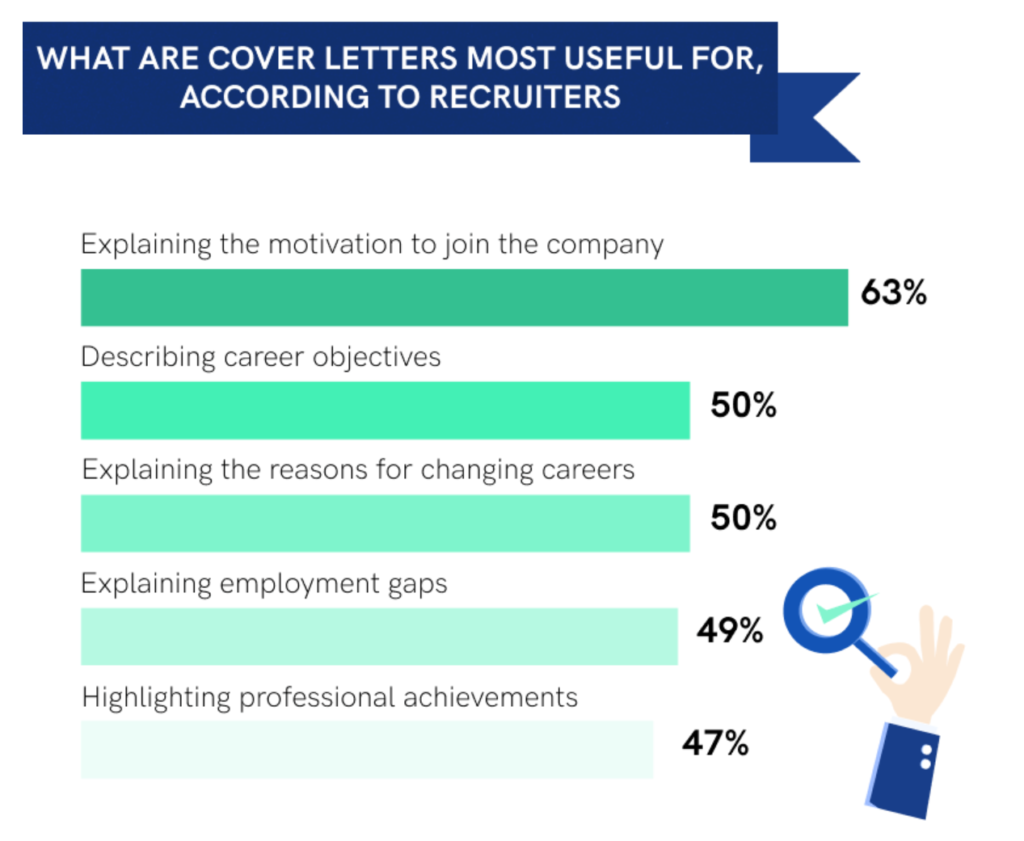
Why is explaining your motivations to join this specific firm so important?
Think of it from the consulting firm’s perspective: they want to hire someone who will positively impact the firm and its customers and someone who is a good fit.
The hiring process is very costly and time-consuming.
Therefore, they don’t want to hire someone who will leave the company after 12 months.
Being specific when you express your motivations to join a consultancy is key.
It won’t impress the readers if you give general reasons that can be applied to other consultancies.
Even worse, it shows that you haven’t done your homework and haven’t done any research about the company.
Thus, do not write, “I want to work for McKinsey because it’s the market leader” or “I want to join the Boston Consulting Group because I’ll be able to work with smart people.”
Note: I’ll show you how to use these two (good) reasons yet sound specific.
So, now let’s see how to express your motivation to join this firm in particular.
To begin with, let’s see what Paul wrote in his McKinsey cover letter.

Paul gave two reasons why he is interested in joining McKinsey & Company.
Each of his reasons follows this formula:

Step 5.1: Start By Giving A Reason Why You Want To Join This Company
You want to join a top consulting firm for many good reasons.
So if you are asking yourself, “Why McKinsey?”, “Why BCG?”, “Why Bain?”, “Why Deloitte?”, Why Accenture?” or “Why any other firms,” you should consider the following reasons:
- The company’s culture: you think you’ll be a good fit with the company’s culture. For instance, the culture of excellence at McKinsey. Or the collaborative culture at Bain & Company. Another example: the diversity of profiles promoted by the Boston Consulting Group
- Its reputation: you want to work for a company recognized as a global market leader, such as McKinsey & Company. Or do you want to join a well-known advisor in a specific geography like Bain & Company in the Middle East?
- The company’s specialization: you can have a special interest in a topic or an industry and join a firm with expertise in that topic or industry. For instance, Simon Kucher & Partners for pricing, or Bain & Company for Private Equity. Or maybe McKinsey is the only consulting firm working with public entities in your region
- Smart colleagues: you want to be inspired and work with people inside and outside the firm who will challenge your work and how you think. For instance, McKinsey is obsessed with working mainly at the CEO level
- The company’s size: you want to join a new (or a small) office and be part of the teams that will help develop that office. Or the office can be well established, but you want to join a newly created practice and want to help develop it
- The company’s international footprint: you want to have the opportunity to work in an international environment or to be relocated to an office abroad in a couple of years. For instance, some consulting firms have international staffing rules, whereas others offer only local staffing opportunities
- The career progression opportunity: you want to join a company that invests a significant amount each year to train their consultants. For instance, Bain is known to put a high value on training their employees
So, think of “Why do you want to work for this company?” or “What attracts you to work for this company?” and check which reasons make sense.
However, if your cover letter mentions some of the previous reasons without any more explanations, your answer will sound very generic (and weak).
For instance, if you write, “I want to work for a prestigious company and be surrounded by smart colleagues,” this can be applied to most consulting firms.
That’s why you need to add evidence that you know what you are discussing.
In other words, you must show that you did your homework and researched the company.
That’s step 5.2.
Step 5.2: Then, Back-Up Your Reason With A Persuasive Source Of Information
To make your answer convincing, you must back up your reason with a good source of information.
Thus, you will show the readers that you are not applying to this firm for random but thoughtful reasons.
To do so, there are three persuasive sources of information that you should consider::
- Consultants who work at the company you are applying to. Your interviewer wants to know if you have done your homework and have talked to anyone from the office you are applying to, or at least from the firm in general. In other words, networking is super important.
- Reports produced by the company, such as the McKinsey Quarterly or the BCG Insight. Tell them you read and found interesting a report or an article about a topic you like.
- Alumni with whom you have worked with. If you had the opportunity to work with alumni from the firm you are applying to, mention it. This shows that you have an idea of what working there looks like.
To conclude, back up the reasons why you want to join a company with one of these sources of information, and you’ll show the readers that you researched the company and thus demonstrate real interest.
Step 5.3: Finally, Explain Why This Reason Is Important For You
Now, it’s time to make it personal.
As for your skills (read again writing tip 6, “Show your personality in your cover letter” if necessary), explain why this particular reason is important for you.
For instance, you can explain why working for a global market leader such as McKinsey is important:
You are excited by the opportunity to work on impactful projects.
Another example:
You can explain why the focus of Bain & Company on having an impact is important for you: you need to have tangible results from your work.
Step 5.4: Repeat The Previous Steps 1 Or 2 Times
Try to give a minimum of 2 (and a maximum of 3) reasons why you want to join a particular firm.
Therefore, repeat the previous steps 1 or 2 times.

Step 6: say why you want to pursue a career in consulting (optional)
This section is optional.
90% of the time, your management consulting cover letter should NOT include this section.
If you need to include this section, keep it short.
My recommendation is a maximum of 3 or 4 lines.
And to do so, the process is simple.
First, select one or two reasons you want to pursue a career in consulting.
Here are some examples of reasons to pursue a career in consulting:
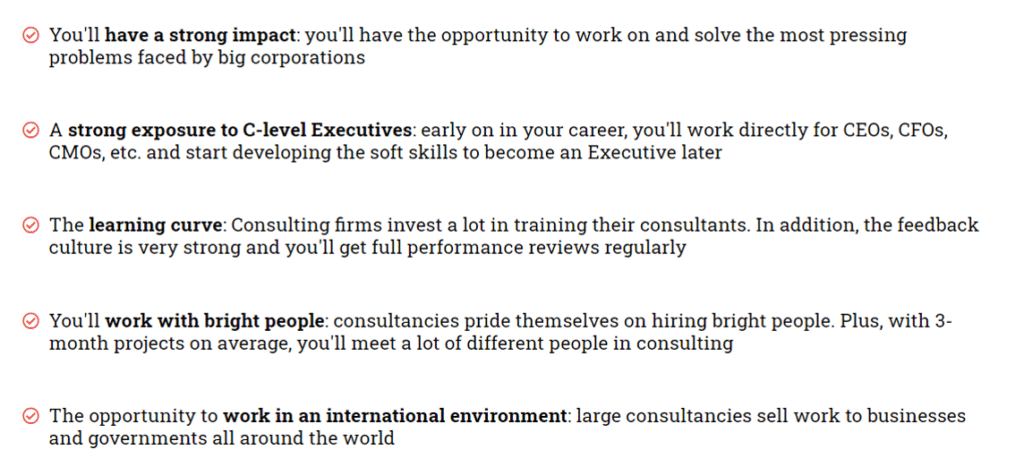
Second, explain why this reason is important for you.
For instance, why is having an impact important for you?
Or why is working in an environment with a strong learning curve important for you?
Again, keep your answers concise.
Step 7: end with a call to action (mandatory)
This is your call to action.
Thank the readers for their time, and let them know you’re excited to be interviewed.
I would welcome the chance to discuss further your expectations and how my analytical, leadership, and communication skills can bring value to McKinsey.
Always be polite and respectful in your close.
Let them know how eager you are to be interviewed, but never make demands.

Step 8: add your consulting cover letter signature
Sign off your letter with a “Best” or “Best regards” (remember to include a comma), followed by your name.
You can use other phrases like “Yours sincerely,” “Kind regards,” or “Best wishes,” but “Best” or “Best regards” are the safest options.

Step 9: proofread and check typos
Now it’s time to polish your consulting cover letter to ensure it stands out.
Like your resume, your cover letter is one of the few things in your life that needs to be perfect.
Thus, you must put the same attention to detail in your cover letter as Consultants do with their slide deck presentations.
In other words, perfection is the minimum standard your cover letter must pass to keep it out of the rejection pile.
Pay close attention to the following areas to make your cover letter bulletproof.
#1: Typos
Imagine finding out that your application — the one you spent hours working on — was dismissed because of a few small spelling or grammar errors.
That would be tough to take.
But it happens.
A lot.
Hiring managers must review hundreds of resumes and cover letters.
And typos are one of the easiest ways to narrow applicants down.
So, double or triple-check your cover letter.
When you’ve done that, have someone else read over it.
#2: Formatting Errors
Large blocks of text are hard work on the eyes, especially on a screen.
Therefore, keep sentences short and limit paragraphs to three or four sentences.
Moreover, I recommend using bullet points when describing your most critical skills and achievements.
Another thing to remember is that your cover letter and resume will be read together, so the two should be consistent in how they look.
Thus, match the style of your cover letter to your consulting resume.
To help you, I have put a cover letter template at the end of this article.
In addition, you can find a resume template in this article.
#3: Any Trace of Copy And Paste
The “I am writing to apply for the role of [job] at [company]” example from a previous cover letter is classic copy-and-paste.
Anything non-specific or generic immediately has the hiring manager wondering how many other people you’ve tried to impress with your robotic writing.
This doesn’t mean you shouldn’t use copy-and-paste templates.
It just means you shouldn’t make it obvious that you do.
#4: Too Many Words
According to a survey by Saddleback College, almost 70% of employers want a cover letter to be less than one page.
24% say that the shorter, the better.
Generally, your consulting cover letter should be less than 500 words and fit on a single page.
Let me repeat because it’s important:
Your consulting cover letter must be on one page.
#5: File Name And Type
First, use the PDF format when submitting your cover letter to a consulting firm unless otherwise specified by the company or recruiter.
Besides, when assigning a file name to your cover letter, include your first and last name along with the name of the company you’re applying to in the name of the file, like “Sébastien Ritter Cover Letter McKinsey.”
Step 10: get your cover letter reviewed by an expert
To ensure your consulting cover letter is error-free, share it (with this article 😉) with your friends and ask for feedback.
But do not ask all your friends.
Instead, focus on these three people: a grammar champion, an HR person (preferably in the consulting industry, but non-consulting HR is fine, too), and a Consultant.
Step 11: complement your cover letter with a great CV
I recommend focusing your time and energy on your consulting resume before writing your cover letter.
Because recruiters say they spend a maximum of 60 seconds deciding whether a candidate should be invited for an interview, they probably start by figuring out whether you have the skillset and education required for the job.
And that’s the purpose of the resume.
For instance, I recommend spending 80% of your time writing your CV and 20% writing your cover letter.
Check this article that will help you craft your CV.
You’ll find a step-by-step guide, templates, and examples to help you craft a perfect consulting resume.
My best consulting cover letter tips
In 2023, I analyzed 147 management consulting cover letters.
As a result, here are my 7 best cover letter tips.
And here is the best part:
You’ll also learn the most common mistakes to avoid at all costs.
Consulting cover letter tip 1: Personalize your letter for each firm
Never send a generic cover letter.
This implies that you must create a new one for each firm.
Consulting cover letter tip 2: Simplify your letter
Clarify and condense your message.
Using complicated words and sentences would almost certainly fail to convey your intentions to the company, and the person reading the letter probably won’t bother with the rest of your application.
Consulting cover letter tip 3: Be specific when needed
Make sure to quantify your accomplishments.
For instance, elaborate on your marketing expertise in your cover letter by stating that you increased revenue to $10,000 while bringing in 200 more clients monthly.
Having specific personal information can help you stand out from other applicants.
Consulting cover letter tip 4: Omit unnecessary details
Let’s state the obvious:
You don’t need to mention your graphic design experience.
Personal information like accomplishments in leisure activities, interests, and hobbies are best left out.
Consulting cover letter tip 5: Show Your Value
When applying for consulting positions, it’s a common error for candidates to focus only on their individual accomplishments.
Cover letters with many “me memes” are frequently read by recruiters.
This means that rather than emphasizing how they can contribute to the company (and eventually become partners), many applicants concentrate on how they will personally benefit from the position in question.
In your cover letter, highlight how your skills will help the company.
Consulting cover letter tip 6: Remember that spelling counts
Grammar and spelling mistakes can indicate that you neglected to proofread your own letter.
Additionally, be consistent—do not represent a dash with “—” in one location and “–” in another.
Consulting cover letter tip 7: Give Yourself Time to Write a Quality Letter
A strong consulting cover letter takes time to write, just like consulting resumes do.
It’s important to consider your accomplishments and what sets you apart from others if you want to be successful.
Think twice before assuming you can create a quality cover letter in a single evening.
It necessitates numerous revisions, careful rereading, and prompt feedback.
Additionally, you must ensure that the cover letter complements your resume flawlessly and elaborates on your impressive abilities and experiences.
Four consulting cover letter examples
In the next 4 sections, you can find sample cover letters for McKinsey, BCG, and Bain & Company.
McKinsey cover letter (Undergraduate)
Now, you can see a first consulting cover letter sample.
That’s the McKinsey cover letter used by Paul.
Please note that this Junior Consultant cover letter (or a cover letter for the Associate Consultant position) can also work for other positions.
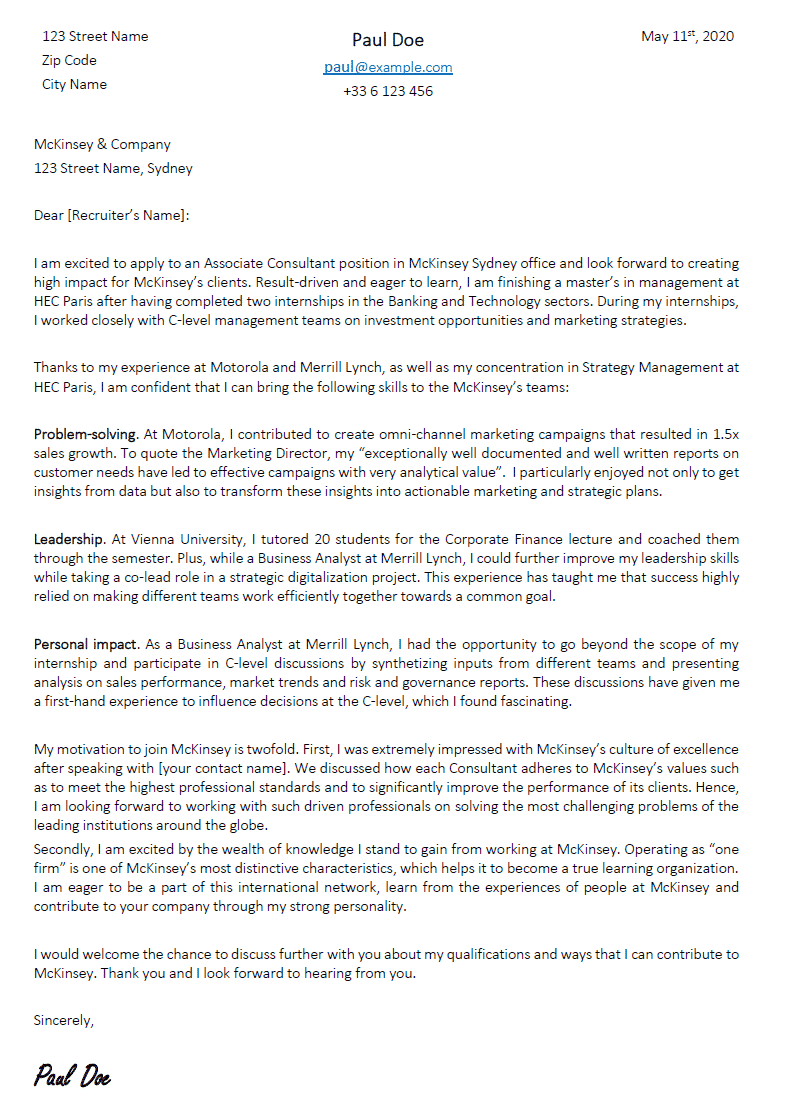
BCG cover letter (experienced hire)
Here is now a BCG cover letter from an experienced hire.
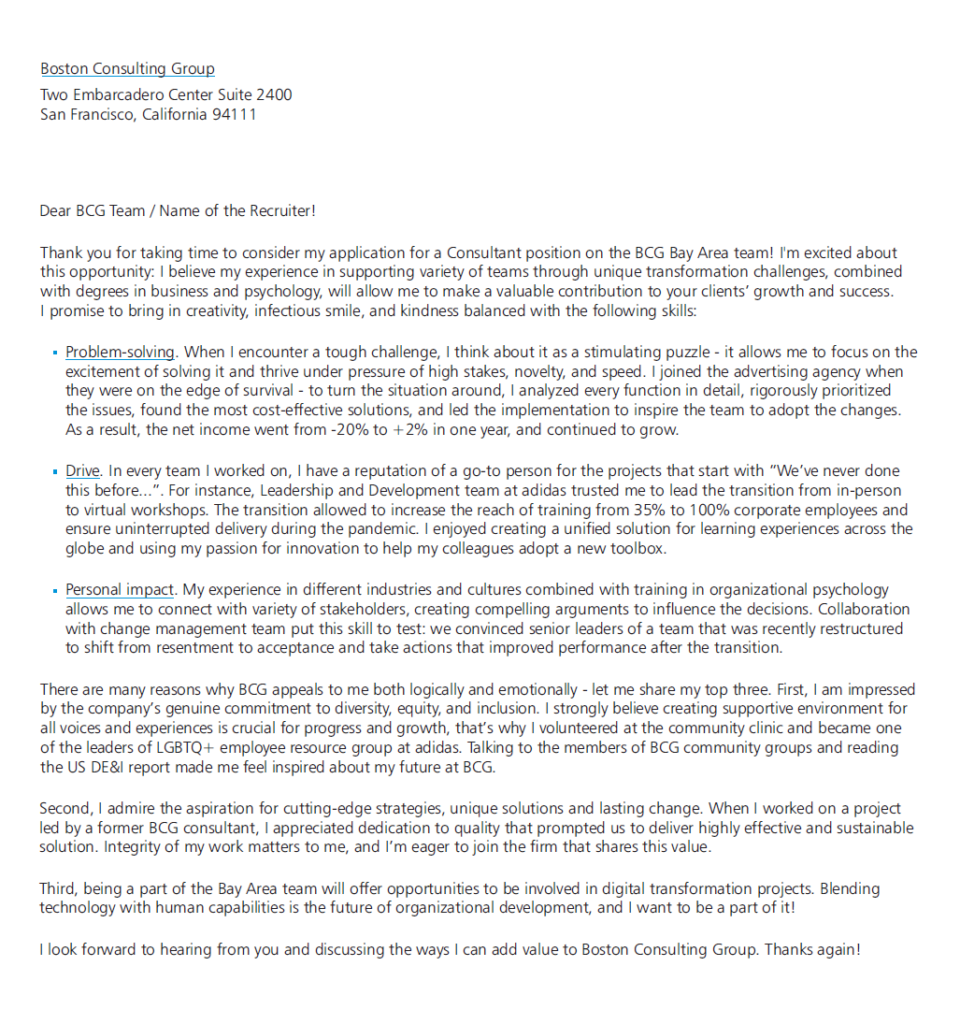
Bain cover letter (Undergraduate)
Here is now a Bain & Company cover letter from an undergraduate student.
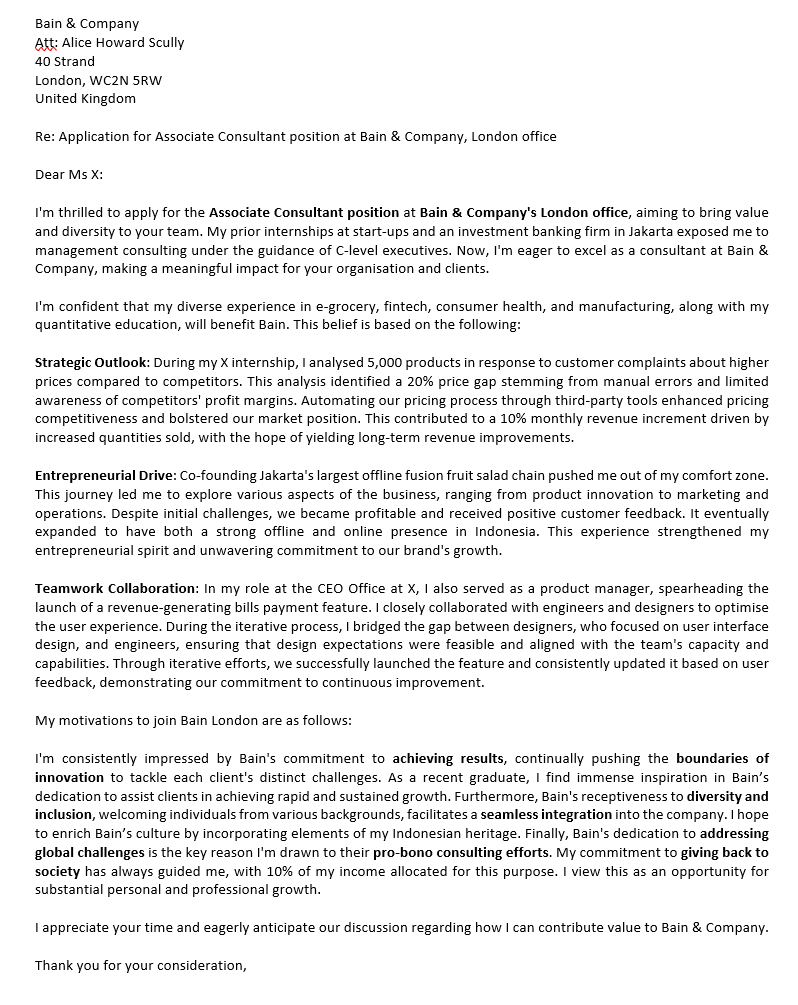
Bonus: McKinsey cover letter from FirmLearning
Here is another McKinsey cover letter example from the YouTube channel Firm learning:
Do you want more consulting cover letter samples?
Then sign up for our free training!
In this free training, you’ll find consulting cover letter samples and tips on acing your consulting interviews at top management consulting firms.
And you’ll improve your problem-solving skills!
Consulting cover letter templates
Do not reinvent the wheel.
Thus, you can download free consulting cover letter Word or PDF templates to fasten the writing process.
These detailed templates will help you correctly outline your management consulting cover letter.
You can use these templates to apply to any top-tier consulting firms, including the following:
- McKinsey
- BCG
- Bain & Company
- Oliver Wyman
- Roland Berger
- Kearney
- LEK
- OC&C
- Deloitte Monitor
- Strategy&
- PWC
- E&Y Parthenon
- And many more.
If you need help writing your resume, these templates will help you.
Here is the Word template.
And here is the PDF template.
Besides, check this article to download consulting resume templates and examples.
Get 4 Complete Case Interview Courses For Free

You need 4 skills to be successful in all case interviews: Case Structuring, Case Leadership, Case Analytics, and Communication. Join this free training and learn how to ace ANY case questions.
Frequently asked questions
How long should a cover letter be?
Aim at 2–4 paragraphs within one page.
Do I need a cover letter?
I ALWAYS recommend adding a cover letter to your application.
Because a well-written cover letter will always distinguish your application.
If a resume shows your Skills and Accomplishments, a consulting cover letter must show your Personality and Motivation.
In other words, a great cover letter is your chance to say something about yourself that you can not put in your resume.
And for securing your dream consulting job, any advantage you can gain over other candidates to land an interview is worth taking.
A good consulting cover letter is one such advantage.
This article helps showcase your personality and motivation in your consulting cover letter.
Also, here is what recruiters say will get an application rejected (source: careerbuilder.com):

Not submitting a consulting cover letter is a risk of rejection.
How to organize your consulting cover letter sections?
Short answer: the order of the sections does not matter much.
For instance, you can organize your management consulting cover letter like this:
- Why consulting
- Why firm
- Why me
Or you can organize the sections of your management cover letter differently.
There is no one-size-fits-all management consulting cover letter winning order.
Consulting cover letter: final words
I hope you found this new guide to writing a persuasive, customized cover letter for consulting jobs helpful.
Now I’d like to hear what you have to say:
Which tip from today’s post was the most helpful for you?
Is it how to show your personality?
Or maybe it is how to express your motivation for a particular firm.
Either way, let me know by leaving a comment below right now.
Sébastien
P.S. Are you looking for help?
If you want a team of experts by your side throughout the entire consulting recruitment process, check if we would be a good fit by clicking here.
Besides, check our clients’ success stories.
We’ve helped hundreds of candidates get offers at top consulting firms around the globe.
The best part?
Those candidates had various backgrounds: MBAs, Engineers, PhDs, experienced professionals, etc.
Get 4 Complete Case Interview Courses For Free

You need 4 skills to be successful in all case interviews: Case Structuring, Case Leadership, Case Analytics, and Communication. Join this free training and learn how to ace ANY case questions.
SHARE THIS POST

Pingback: All About The McKinsey Recruitment Process - Career in Consulting
The only useful and structured cover letter writing article on the whole internet!
Happy that you enjoyed the article, Anthony 🙂
Pingback: What Does A Management Consultant Do? - Career in Consulting
Pingback: All About The BCG Recruitment Process - Career in Consulting
I didnt realise how much i need this article, till i read it . Truly helpful , Thanks Sebastien 🙂
Thanks! glad you found it helpful!
Pingback: All About Bain Recruitment Process - Career in Consulting
Pingback: How to answer “Why McKinsey?”, “Why BCG?”, or “ Why Bain?” questions - Career in Consulting
Brilliant brilliant work, Sebastien! Thank you very much. The best I have come across so far.
Thank you very much Samuel!
Wow, this paragraph is pleasant, my sister is analyzing such things, so I am
going to inform her.
Great article to read, all the tips are great….
Thanks! I’m glad you like it
Ththank you very much for the article which was very interesting, just like the one about the CV!
However, I was wondering if following this structure in 3 adjectives and form could not be penalizing since many people have already followed your article?
Thanks in advance for your feedback!
Hi Thomas. Thank you for your comment, and I’m glad you’ve liked this article!
Regarding your question, besides the structure described in this article, the content (the reasons why you are interested in a firm and why these reasons are important for you) will make your CL unique.
Hope this helps,
Sébastien
I never write comments like this on the internet but felt compelled to express my gratitude. This, and the resume writing article, are the most thoughtful and helpful guides I have ever read on this topic. Although I am a teacher in England (not an American consultant!) I found all the advice to be completely transferrable and have done a major overhaul on my CV. Thank you for being so clear and thorough in your advice – I have shared it with my colleagues and will continue to spread the word to anyone who needs CV writing advice in any profession.
Thank you Emily for the nice comment